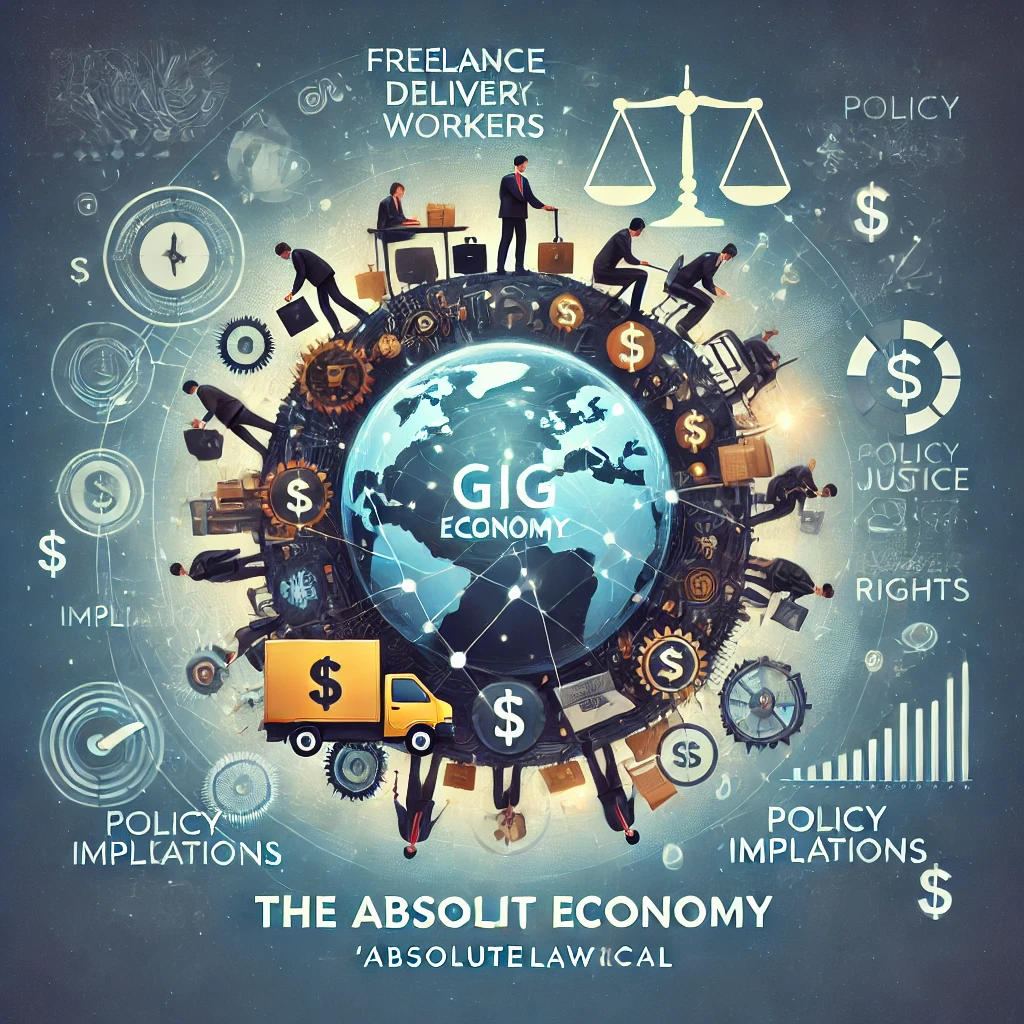EVALUATING THE FLEXIBILITY, POLICY IMPLICATIONS AND WORKER RIGHTS IN THE GLOBAL LABOUR MARKET

ABSTRACT:
The gig economy plays a significant role in the global labour market, it is driven by various technological advancements and shifting in employment patterns. This research focuses on the rise of gig work, the benefits it offers to the workers and businesses, and the challenges that are faced in terms of employment rights, regulatory framework and income stability. This study examines how the gig economy is reshaping the labour markets using examples of different countries and what are the future policy changes that may be necessary to balance the flexibility and security for gig workers.
KEYWORDS: Gig economy, Labour market, Policy reform, Worker rights.
INTRODUCTION:
The gig economy refers to a labour market where the full-time employment is replaced by short-term, flexible, and freelance jobs. These jobs are typically mediated by digital platforms, which enables the companies to connect with independent contractors or “gig workers” on a project-by-project basis. Gig work includes diverse industries such as ride-hailing services like Uber, Ola, Lyft and freelance design and programming platforms such as Upwork and Fiverr. The rise of the gig economy is connected to various technological advancements, shift in
employment preferences, and the global financial crisis of 2008, which has resulted in fewer full-time employment opportunities and has stimulated the growth of alternative work arrangements (Stewart & Stanford, 2017).
METHODOLOGY
This research is based on Doctrinal research method. This is a comprehensive study from Secondary data through various literatures consisting of published articles and research papers and other sources like books, magazines, websites and case studies that focuses on the gig economy’s economic impact, the legislative frameworks, and workers experiences across different countries.
HYPOTHESIS
The gig economy provides various flexibility for workers but it also presents challenges such as income instability, lack of benefits, and erosion of traditional employment protections.
RESEARCH QUESTION
What are the challenges and opportunities faced by the workers of gig economy, and how should the policymakers address the economic and social implications as a result of gig economy?
HISTORICAL BACKGROUND
The gig economy has entrenched in the freelancing work, which has been a long existing alternative to the salaried employment. However, the emergence of internet and mobile technology in the early 2000’s has significantly accelerated the growth of gig economy (Sundararajan, 2016). Platforms like Door-Dash, eBay, 99-Designs, Craigslist, and later Airbnb and Uber have provided early models for gig work by offering users the chance to monetize their skills, assets, knowledge, time and potential. The financial crisis of 2008 and the subsequent recession and impact of Covid-19 has led many workers to turn to gig platforms for additional income. This shift from the traditional full-time employment to more fluid forms of work has marked the rise of the gig economy as a global phenomenon (Katz & Krueger, 2019).
LEGAL PROVISIONS AND POLICIES
The gig economy operates within the legal framework of various jurisdictions. The legal framework of gig workers has been a subject of debate till date, as the workers often being classified as independent contractors rather than employees. This classification had denied the gig workers to obtain protections under Labour laws, such as minimum wage given, paidleaves, and other medical and healthcare benefits (Cherry, 2016). Many countries have been slow in adapting their labour laws towards gig economy, leaving the workers in gig economy in a very unstable and precarious position.For instance, in the United States, the Fair Labor Standards Act (FLSA) does not cover the gig workers, as they are not been considered as employees which has led to their precarious position with regard to minimum wages, over-time pay and other employee benefits. However, the recent efforts by the California’s Assembly Bill 5 (AB5) aimed to reclassify the gig workers as employees, though it faced a lot of pushbacks from companies like Lyft and Uber (Dubal, 2020). Similarly, in case of the European Union, the Directive on Transparent and Predictable Working Conditions had attempted to extend certain rights to the gig workers as well, but with respect to the implementation of these rights to gig workers across member states has been uneven (De Stefano, 2020).
PRECEDENTS AND CASE STUDIES
Several legal cases in the recent times have highlighted the various tensions between gig workers and the companies. For instance, in 2020, the United Kingdom Supreme Court ruled that Uber drivers should be classified as employees and not gig workers. It stated that they should be entitled to minimum wage and holiday pay (Bales & Woo, 2020). This landmark judgement paved the way for similar challenges that were against other gig platforms in the United Kingdom and across Europe. In contrast to this, the United States has seen a more
fragmented approach towards this challenge, while the states like California is pushing for the reclassification of gig workers as employees, the other states continue to classify them as independent contractors and not employees.
The distinct outcomes of these cases show the difficulty in applying traditional labour laws to a new and digital-based economy. Many workers have to rely on individual court battles to secure their rights which has leading to inconsistent protections for gig workers across different places (Harris & Krueger, 2015).
BENEFITS AND OPPURTUNITES OF GIG ECONOMY
Gig Economy provides various benefits and opportunities to the workers such as:
- Empowering Entrepreneurship –The gig economy empowers the individuals to become more self-employed and it also offers a low barrier to entry into entrepreneurship. Platform such as Etsy or Upwork allows users to sell their products or services directly to consumers, creating an effective marketplace for freelancing entrepreneurs (Berg et al., 2018).
- Saves cost for Businesses –Hiring gig workers reduces the costs of businesses and increases their operational flexibility. Companies can get into a large pool of talent without having any long-term financial commitment that are being associated with the hiring of full-time employees (Sundararajan, 2016). This gig economy plays significant role in startups or small businesses where they may not have the necessary resources or funds to sustain in a full-time workforce.
- Liberty and Flexibility – One of the primary aspects of the gig economy is the flexibility it offers to the workers. Gig workers have the freedom to choose their time and place of working like when, where, and how much they want to work which is not available to the fill-time employees. This flexibility allows them to have a better work-life balance, especially for those who cannot afford to commit in full-time jobs due to their personal or other responsibilities and commitments (Munger, 2020). However, the gig economy provides opportunities for talented individuals to monetize their specialized skills or assets and to create a additional source of income that were previously unavailable in the traditional full-time employment.
CHALLENGES FACED BY GIG WORKERS
Lacking worker’s rights– One of the major challenges faced in the gig economy is the lack of legal protections provided for the workers. As the workers in gig economy are considered as independent contractors, they do not receive any employee benefits like health insurance, paid leaves, over-time pay or retirement plans like traditional employment (Munger, 2020). This classification has also limited the workers access to social security and other unemployment benefits, which results in a precarious economic position of gig workers. The COVID-19 pandemic even more reduced the exposure, as many of the gig workers found themselves in a precarious situation without income and no safety plans (Berg et al., 2018).
Unstable Income – Unlike the traditional salaried workers, gig workers often face income instability due to the uncertain nature of their work. Earnings of these workers changes based on demand, platform fees, and competition from the other workers. However, gig platforms will alter their algorithms or payment which leads to sudden slimming in income for workers (Cherry, 2016). Due to the lack of financial stability gig workers face difficulty to plan for their future or secure loans and mortgages based on regular income.
Regulatory Implications -gig economy has numerous regulatory challenges for the policymakers. Existing Labour laws are designed for traditional full-time employment models and thus it poses a great difficulty to provide such benefits to gig workers. Therefore, the policymakers should take the necessary steps to protect the gig workers at
the same time maintain the flexibility of gig economy so as to make it attractive to both the workers and the businesses (Dubal, 2020).
COMPARITIVE STUDY BETWEEN DEVELOPED AND DEVELOPING COUNTRIES
The Gig economy’s impact varies significantly between the developed and developing countries. In developed countries, gig work is a secondary source of income for the workers looking for additional earnings. Contrarily, in developing countries, the gig economy will be a primary source of income for many workers (Katz & Krueger, 2019).
For example, in countries like India where unemployment rate is very high platforms like Uber and Ola have provided a vital income source income for drivers. However, the lack of social security for gig workers in developing countries like India depends on the risks associated with the type of gig work (Berg et al., 2018). Workers in these countries have a very few legal protections available and less bargaining power compared to developed and wealthier countries.
IMPACT OF TECHNOLOGY
The rise of digital platforms has facilitated the gig workers. Various platforms through their algorithm work on connecting the clients based on their needs, demands, location, etc., These platforms collect data in large amount which is used to improve service efficiency but it may also lead to various issues related to data security and worker privacy Cherry, 2016). Although AI will increase the efficiency and reduces the costs of companies, it also posses threat to replace many of the low-skilled gig jobs, potentially making millions of gig workers
unemployed (Sundararajan, 2016). Thus, the increase in technology has both positive as well as negative impact on gig workers both in developed and developing countries.
CONCLUSION AND FUTURE RECOMMENDATIONS
Thus, the gig economy provides potential benefits and opportunities to the gig workers but also has various challenges associated with it. Therefore, the policy makers should critically examine and take necessary steps to create a safe and stable policy framework for gig workers to ensure that they have a work life balance. The policies should include the benefits provided for the traditional model employment like minimum wages, overtime pay, health insurance and others. Furthermore, the businesses and companies should also take adequate measures to give equal work and income protection to gig workers along with the workers in traditional working model.
REFERENCES
- Cherry, M. A. (2016). Beyond misclassification: The digital transformation of work. Comparative Labor Law & Policy Journal, 37(3), 577-608.
- Berg, J., Furrer, M., Harmon, E., Rani, U., & Silberman, M. (2018). Digital labour platforms and the future of work: Towards decent work in the online world. International Labour Office.
- Dubal, V. B. (2021). Winning the Battle but Losing the War? Assessing the impact of California’s AB5 on workers. Industrial and Labor Relations Review, 74(1), 23-41.
- De Stefano, V. (2016). The rise of the “just-in-time workforce”: On-demand work, crowd work, and labour protection in the “gig-economy.” Comparative Labor Law & Policy Journal, 37(3), 471-503.
- California Assembly Bill 5 (AB5). Retrieved from California legislative information.
- Directive on Transparent and Predictable Working Conditions, European Commission. Retrieved from European commission
- Bales, K., & Woo, M. (2020). The UK Supreme Court and Uber: Employment status and rights of gig workers. Journal of Employment Law, 37(1), 67-89.
WRITTEN BY: OVIYA S, LAW AND ENTREPRENEURSHIP SOCIETY, RAMAIAH COLLEGE OF LAW
